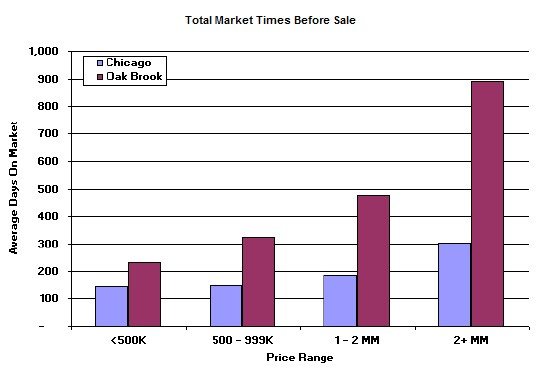Single family homes in Oak Brook are way overpriced. How do I know this? There are two glaring indicators based upon sales data from the last year.
First, all you have to do is look at what homes in Oak Brook are selling for relative to their list prices and the discounts are huge compared to what you see in Chicago. Check out the graph below which breaks out the discounts by price range. The higher the price range the greater the discount percentage but in every price range Oak Brook discounts are way larger than Chicago’s.

BTW, just because the average Oak Brook home is overpriced does not mean all Oak Brook homes are overpriced and it does not mean you should be able to get the average discount from list on any home you intend to buy. The discount you can get will totally depend upon where the seller’s head is and how the home is priced relative to it’s real value. More on that another time.
Second, check out the huge Oak Brook market times in the graph below. Oak Brook homes clearly sit on the market much longer than Chicago homes.

One caveat about this data: First, you should note that to make the Chicago data comparable to the Oak Brook data I didn’t look at any homes listed below $300K in the past year. Second, the Oak Brook sample size is much smaller than the Chicago sample size – 57 homes vs. 1575 homes – but I believe it’s big enough to draw the conclusions I draw here.
Consequences Of Overpricing A Home
So what are the consequences of overpricing a home? First, I’m not going to show you some fabricated realtor BS chart that shows overpriced homes selling below their market value. I’ve seen those charts and they are ridiculous. Whoever created them has no basis for creating them. There is absolutely no way to know what an overpriced house would have sold for had it not been overpriced.
Nevertheless, your ability to get the highest price for your home will be compromised simply because you are trying to sell in an information vacuum. Because your home is overpriced you will not be getting enough showings and if you are priced over a key search threshold then many of your potential buyers may not even know about your home. Consequently, you will be lacking key information that can be used to discover the true price at which your home might sell. When an offer comes in well below your asking price you won’t know for sure if it’s a lowball offer or on the mark and you won’t know if you could have gotten a better offer had you been priced lower and solicited more interest. Sure, your realtor will have pulled data on comparable properties but you didn’t believe it the first time you saw the data so why will you believe it now? Besides, the best data is the feedback you get from lots of showings and a few offers on your home.
Besides price the other obvious drawback to overpricing a home is demonstrated rather dramatically in the second chart above – it’s going to take a much longer time to sell the home.
Home Pricing Myths
So why do some sellers overprice their homes? Usually it’s because they cling to one or more myths:
Myth #1: The buyer is going to offer me less than my asking price so I might as well start high – i.e. the higher I price it the more I will be able to get. Well, that myth just doesn’t hold water. As shown in the Oak Brook data above buyers will just take an even greater percentage off your asking price. Besides, even if it were true the time to play hard ball with a buyer is after they make an offer not before they even see it. If you don’t like their offer you don’t have to accept it.
Myth #2: This is the price I need/ want and if I wait long enough someone will come along that sees the value in this property and they will pay this price. Well, I’m not going to give you the drivel about houses getting stale on the market. I just don’t find that to be a very believable explanation. What I will tell you is that if no one has bought a house that has been listed for 90 or 120 days at a given price then it signals to potential buyers that it’s probably not worth what is being asked and they lower their perception of it’s value. Who wants to pay a price that no one else was willing to pay?
Furthermore, at any point in time there is a 3 – 6 month pipeline of buyers in the market and if any of them are interested they are going to act within the first few weeks of your home being on the market. After those first few weeks your potential market is limited to the trickle of new buyers that are coming into the pipeline each week and it will take a long time for you to match the exposure you got in the first couple of weeks.
So What’s A Home Seller To Do?
It’s actually pretty simple. You need to be realistic about the market and work with your realtor to analyze the data coming in once your home is on the market. If your home has been on the market for an extended period of time with poor results it’s a pretty safe bet that it’s not going to sell any time soon at anywhere near your asking price. You might as well either take it off the market or lower the price.
